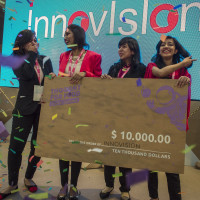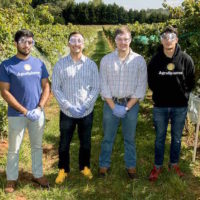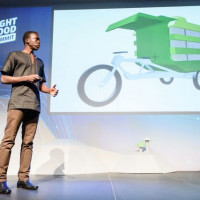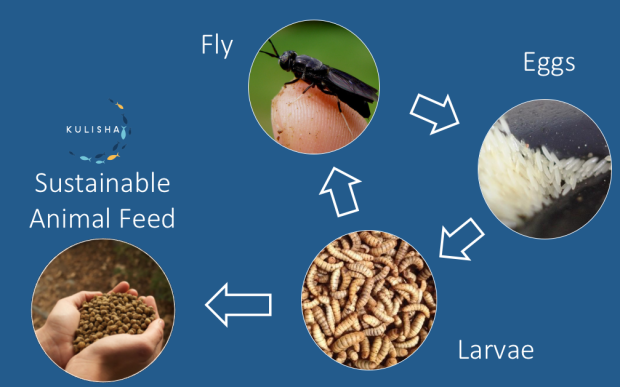
Our Millennial Innovators Uprooting Our Food System series, which profiles the bright, creative and driven university students from around the world that make up Thought For Food (TFF), a next generation food innovation platform (check out last year’s series here). A global community as well as a summit and business competition, TFF empowers breakthrough solutions to feed nine billion people by 2050.
USA-based Kulisha is taking on the destructive fishing practices of commercial vessels. Practices like bottom trawling, blast fishing and cyanide fishing result in unintentional by-catch and the destruction of coral reefs. As the world’s population continues to increase, finding regenerative sources of protein is imperative. Kulisha is betting on the Black Soldier Fly as this alternative source of protein.
Their waste treatment process converts organic waste from food and beverage producers into a high-quality insect protein animal feed. The black soldier fly larvae feeds on organic waste, becoming a safe, high-protein alternative to fish meal in a matter of days. In terms of sustainability and food waste benefits, insect protein should not be ignored. We spoke with Eric Katz and Maya Faulstich-Hon, co-founders of Kulisha, about how they will contribute to global food security, what progress they have made since inception one year and a half ago, and a bit about crowdfunding.
____________________________
Thought For Food: What was the inspiration for Kulisha?
Eric Katz: I met Viraj Sikand while working on the Quinault Indian Nation, one of the largest salmon hatcheries in the US. I was talking to him about an interesting concept I’d seen in which a social enterprise was encouraging rural people to farm insects as a source of human food because of its nutritional benefits. He told me about the village he grew up visiting in Kenya, and how it was being ravaged by trawlers that are fishing for small fish for use in animal feed. He said, ‘you know what would be cool? If you could replace these fish with insects .’ From there, Kulisha was born. We started conducting interviews with fish farmers and got encouraging feedback.
TFF: What challenge does Kulisha solve and how?
EK: Kulisha addresses two problems with one solution. First, we support food and beverage producers — such as breweries, restaurants, and fruit and vegetable processing plants — by treating their organic waste. Waste from these producers is rich in carbohydrates and proteins, yet often is not valorized and ends up in landfills. Disposal of this waste is costly, time-intensive, and inconvenient for these companies.
In addition, the demand for fishmeal for use in animal feeds is driving the destruction of the world’s oceans. Over one-third of global fish catch is ground into meal and is the primary protein source for poultry, fish, and swine feed. The feed industry is a major contributor to the fact that more than 85 percent of the world’s fisheries are exploited. Kulisha will create a sustainable insect protein and, in the process, cut costs for food and beverage plants by reliably and consistently using their waste.
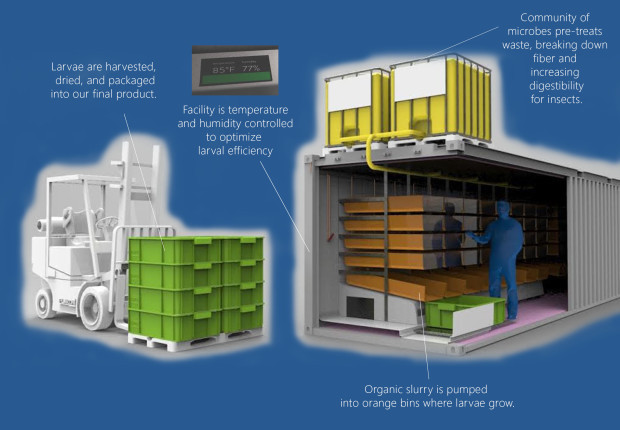
How does the Kulisha system work?
TFF: What role do you see Kulisha playing in global food security?
EK: The world’s population continues to increase rapidly; the UN’s latest projection is that there will be 9.7 billion human beings on the earth by 2050. Developing sustainable and healthy sources of protein will be key as we move forward in feeding more people.
Aquaculture, especially fish farming, is a rapidly growing industry with the potential to provide an accessible and sustainable source of protein. But one major issue is that the current feed for these farmed fish is made from wild-caught anchovies, sardines, and herring. If we want fish farming and other livestock industries to truly be sustainable, we must find a replacement for this fishmeal—and we believe black soldier flies are part of that solution.
How much money have you raised to date and from whom?
Who are your customers?
TFF: What are your plans for Kulisha in the near future?
MFH: In the year and a half since our inception, we have focused on furthering research & development, securing grant funding, and engaging stakeholders. We are currently working with a team of four engineering and industrial design students from Brown and RISD, as well as a PhD student in robotics and mechanical engineering, to lay out detailed designs for the refinery. Meanwhile, at the University of Michigan, we have assembled a team of four computer science and electrical engineers with experience in machine learning technology to develop the hardware and algorithm components of the refinery system.
Our next step is to identify a partner company with which to implement our first refinery. We are currently in advanced talks with a brewery in Austin, Texas, who is interested in partnering to construct an initial pilot facility. Here, we will prove the concept at scale and refine our technology, allowing us to then expand to other breweries and across the food and beverage industry.
To finish securing financing for this next big move, we recently launched a crowdfunding campaign! Check it out here.
TFF: If you could offer one piece of advice to entrepreneurs interested in developing food security solutions, what would it be?
EK: Dip into all existing resources and networks that are accessible to you! Constantly getting your idea questioned is the best way to develop it, and when people identify problems they can often help to identify solutions. Make connections, build your network—food security is truly a global wicked problem and there are so many amazing minds tackling various facets of it that you can’t afford not to make connections with others.
TFF: What was your experience like as a TFF Finalist and how did that experience shape where Kulisha is today?
EK: The experience was absolutely incredible. Being surrounded by other passionate, ambitious students, and having the opportunity to challenge each other’s’ ideas from unique, global perspectives, was a once in a lifetime opportunity. Winning the $10,000 grand prize at the TFF Challenge allowed us to build our prototype facility and prove our model. This enabled us to be where we are now, designing a scaled facility built around our existing processes, and hoping to bring ourselves to a commercial level of production.
____________________________
The Thought For Food Global Summit will be taking place May 26-27, 2017 in Amsterdam. Hear from leading innovators and inspiring thought leaders from a variety of fields. Experience firsthand the creative power and impact of the next generation. Watch breakthrough startup pitches from the 2017 TFF Challenge Finalists as they compete for the Grand Prize!

